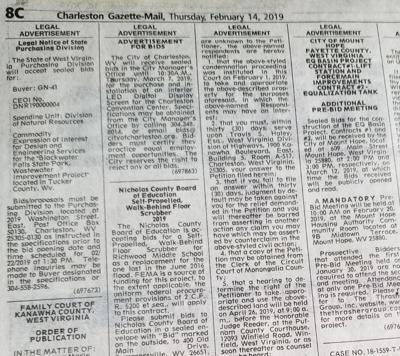From The Charleston Gazette-Mail:
Every so often, someone in the West Virginia Legislature or elsewhere gets the idea that state and local governments should stop running legal advertising in newspapers. It’s an expense that can be done away with in the internet age, with no harm done to the public’s ability to know what’s going on in their area, right?
Not really.
That idea has come up again this year in the Legislature, with two bills that would limit the amount of public notice that is published in print.
House Bill 2715, introduced by Delegate Geoff Foster, R-Putnam, would order the State Auditor’s Office to establish a website centralizing all postings of legal advertisements required by law. It allows state and local governments to publish Class II and Class III legal notices once in a local newspaper, instead of the current requirement of two or three weeks if the notice also is placed on the state Central Legal Advertisement website for the time period otherwise required by law.
Thus, it wouldn’t eliminate the requirement for legal ads in local newspapers, but it would reduce their frequency.
Foster’s bill does not apply to Class I legal ads, which are published only once.
The bill was referred to the House Judiciary Committee.
Then there’s Senate Bill 318, introduced by Sen. Robert Karnes, R-Randolph. It would eliminate the requirement that the state treasurer publish the full list of the unclaimed property registry and, instead, require that the information be included in a publicly available online database. The treasurer would need to provide published notice that the database is available. That legal ad would give directions on how to access the database.
SB 318 has been referred to the Senate Finance Committee.
These seem like reasonable proposals on the surface, but, when you dig deeper, the two bills share common flaws. They appear to work for people in the Capitol, at the county courthouse or city hall, but do internet-based legal ads work for the average resident?
Placing legal ads on a website works if the ads are easy to find and are available for a long period of time.
It also works if everyone has access to affordable, reliable high-speed internet service. And there’s the rub; many parts of West Virginia and other states don’t have that. Add to that the problem of internet outages. They happen. Some people in West Virginia have been without internet service in their homes since the ice storms of last month, when phone and cable lines went down.
There’s also the fact that online legal ads can be buried in a user-unfriendly website. That would be a great place to hide important information.
Sure, there is some self-interest when newspapers object to limiting or eliminating some legal advertising. Newspapers make money on legal ads. Some smaller newspapers could face closure if that income dried up or was reduced greatly — a development that could cost the state jobs. Legal advertising is a reliable source of income in a time when other ad revenue is diminishing.
But counties make money on legal ads, too.
At a meeting last year of the House Judiciary Committee, Don Smith, executive director of the West Virginia Press Association, said most counties more than make up the costs of legal ads with publication fees they assess to the subjects of those ads.
For delinquent property tax notices, for instance, counties assess a $25 publication fee at the time the property owner pays the back taxes or when the property is sold at public auction.
For example, Boone County reported that it paid $4,923 for legal ads during the 2018-19 budget year, but it collected a total of $69,725 in publication fees. That works out to more than $14 received for every $1 spent on legal ads.
What private enterprise, county government or school board would turn down a return on investment of 14-to-1?
To quote from the Press Association’s statement on legal advertising, “West Virginia newspapers are part of their communities. They represent hundreds of jobs across all 55 counties. A local newspaper is an invaluable partner for businesses and industries and the primary source of news for residents. Legal advertising in newspapers effectively delivers the notice to the public.
“Legal advertisements for public notices should appear in local newspapers where West Virginians look for news.”
No matter how newspapers and legislators go back and forth about legal ads in newspapers, the fact is that legal ads work for the people. It’s a filter-free way to inform the public about delinquent taxes, plans to build roads, sample ballots and many other important items of public interest.






